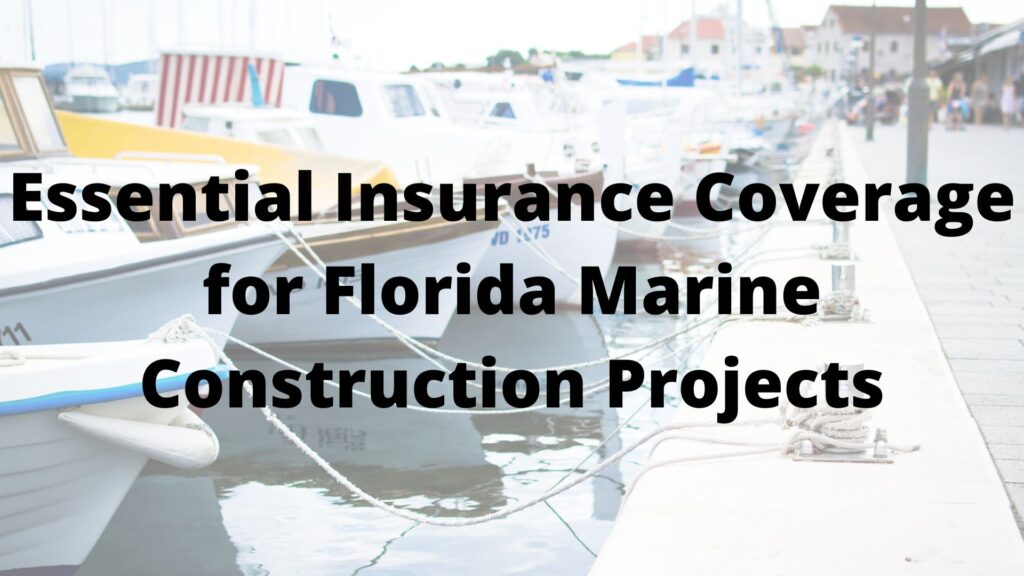
Florida, with its extensive coastlines and abundant waterways, is a hub for marine construction. From building seawalls and docks to maintaining bridges and harbors, marine contractors face a unique set of risks that go far beyond typical land-based construction. Understanding the specific insurance needs and potential pitfalls is crucial for protecting your business and ensuring project success in this dynamic environment.
The Unique Landscape of Marine Construction Risks
Unlike traditional construction, marine projects are constantly exposed to the unpredictable forces of water, weather, and specialized maritime regulations. This inherent risk creates a distinct need for tailored insurance solutions. A standard general liability policy, for instance, often explicitly excludes marine work, leaving contractors dangerously exposed if they’re not properly covered.
Key Insurance Coverages for Florida Marine Contractors
To effectively safeguard their operations, marine contractors in Florida should consider a comprehensive insurance portfolio that addresses both common construction risks and the unique challenges of the marine environment. Here are some essential coverages:
Marine General Liability (MGL): This is perhaps the most critical coverage for marine contractors. Unlike a standard Commercial General Liability (CGL) policy, MGL is specifically designed to cover bodily injury and property damage claims arising from operations on or near navigable waters. It often includes coverage for products and completed operations liability for work performed from watercraft, and crucially, addresses “care, custody, and control” exposures often excluded from CGL.
Commercial Hull & Protection and Indemnity (P&I): If your business owns or operates vessels (workboats, barges, tugs, etc.), Hull insurance covers physical damage to the vessel itself, including its machinery and equipment, due to perils like collision, sinking, or extreme weather. P&I insurance, often bundled with Hull, provides broad liability coverage for vessel owners, including claims for personal injury or death to crew or third parties, property damage to other vessels or structures, wreck removal, and pollution.
United States Longshore and Harbor Workers’ Compensation Act (USL&H): This is a federal workers’ compensation program specifically for maritime employees who work on or over navigable waters of the U.S., including those involved in ship repair, shipbuilding, and dock construction. USL&H claims typically have higher benefits and stricter legal ramifications than traditional state workers’ compensation, making this a critical coverage for eligible marine contractors in Florida. Even if you hire uninsured subcontractors with USL&H exposure, you could become liable for their workers’ injuries.
Contractor’s Equipment with Waterborne Coverage: Your specialized marine construction equipment – dredges, pile drivers, cranes, etc. – is a significant investment. This coverage protects your valuable tools and machinery from damage, theft, or loss, specifically when they are in transit or actively being used on or near water.
Builder’s Risk (Marine Specific): For larger projects, this policy covers damage to the actual construction project itself (e.g., a new dock, pier, or bridge) during the course of construction, including materials, labor, and potential profit. A marine-specific builder’s risk policy is crucial to ensure perils related to water are covered.
Bumbershoot (Marine Umbrella): Similar to a standard umbrella policy, a Bumbershoot provides excess liability coverage over your primary marine and non-marine policies (such as MGL, P&I, and commercial auto). This additional layer of protection is vital in the event of a catastrophic loss where primary policy limits are exhausted.
Environmental/Pollution Liability: Marine construction inherently carries environmental risks, such as accidental spills of fuel or other chemicals. This specialized coverage helps protect your business from the costly financial liabilities associated with pollution, contamination, and environmental damage.
Commercial Auto Insurance: Even marine contractors use vehicles on land for transporting materials, equipment, and personnel. Standard commercial auto insurance is necessary to cover accidents, theft, and damage to these vehicles.
Potential Pitfalls for Marine Contractors
Even with a strong understanding of essential coverages, marine contractors in Florida can fall into common insurance traps:
Relying Solely on Standard General Liability: As mentioned, this is a major pitfall. Many CGL policies have exclusions for marine work, leaving a significant gap in coverage. Always ensure you have a dedicated Marine General Liability policy.
Inadequate Contractual Risk Transfer: Contracts in marine construction can be complex and often lack standardized language regarding liability and risk transfer. Failure to carefully review and negotiate these terms can leave you exposed to responsibilities you didn’t anticipate. Consult legal counsel to ensure contracts properly allocate risk and align with your insurance coverage.
Underestimating USL&H Exposure: Misclassifying employees or assuming state workers’ compensation is sufficient can lead to severe penalties under federal maritime law. Any employee working on or near navigable waters needs to be assessed for USL&H applicability.
Ignoring Weather and Environmental Risks: Florida is prone to hurricanes and other severe weather. Not having adequate coverage for these events, or failing to implement proper risk mitigation strategies (like securing equipment before a storm), can result in devastating losses.
Lack of Specialized Brokerage: Marine insurance is highly specialized. Working with an insurance agent or broker who deeply understands the marine construction industry is paramount. A generalist broker may not be aware of the nuances and specific exclusions in marine policies, leading to inadequate coverage.
For Florida’s marine contractors, insurance isn’t just a regulatory requirement; it’s a fundamental pillar of business resilience. The unique risks of working on and around water demand a carefully curated insurance program that extends beyond traditional policies. By understanding the specific coverages needed, actively mitigating risks, and partnering with experienced marine insurance specialists, contractors can confidently navigate the challenges of Florida’s waterways and build a secure future for their marine construction projects.
Resources:
- Statewide Insurance – Florida: Marine Contractor Insurance
- Seaman’s Insurance Group: Marine Contractors Insurance
- Merrimac Marine: Marine Contractor Insurance
- Travelers Insurance: Marine General Liability Insurance, 6 Key Liability Risks for Marine Contractors
- John B. Wright Insurance: Guide to Marine Contractors Insurance
- Biscayne Risk: Commercial Marine Business Insurance South Florida
- RLI: Marine Contractors Liability
- FindLaw: Florida Statutes Title XXXVII. Insurance § 624.607. “Marine insurance,” “wet marine and transportation insurance,” and “inland marine insurance” defined.1
- Miguel A. Brizuela, P.A.: What Insurance Do I Need as a Contractor in Florida?
 John Caravella Esq., is a construction attorney and formerly practicing project architect at The Law Office of John Caravella, P.C., representing architects, engineers, contractors, subcontractors, and owners in all phases of contract preparation, litigation, and arbitration across New York and Florida. He also serves as an arbitrator to the American Arbitration Association Construction Industry Panel. Mr. Caravella can be reached by email: [email protected] or (631) 608-1346.
John Caravella Esq., is a construction attorney and formerly practicing project architect at The Law Office of John Caravella, P.C., representing architects, engineers, contractors, subcontractors, and owners in all phases of contract preparation, litigation, and arbitration across New York and Florida. He also serves as an arbitrator to the American Arbitration Association Construction Industry Panel. Mr. Caravella can be reached by email: [email protected] or (631) 608-1346.
The information provided on this website does not, and is not intended to, constitute legal advice; instead, all information, content, and materials available on this site are for general informational purposes only. Readers of this website should contact their attorney to obtain advice with respect to any particular legal matter. No reader, user, or browser of this site should act or refrain from acting on the basis of information on this site without first seeking legal advice from counsel in the relevant jurisdiction. Only your individual attorney can provide assurances that the information contained herein – and your interpretation of it – is applicable or appropriate to your particular situation. Use of, and access to, this website or any of the links or resources contained within the site do not create an attorney-client relationship between the reader, user, or browser and website authors, contributors, contributing law firms, or committee members and their respective employers.
